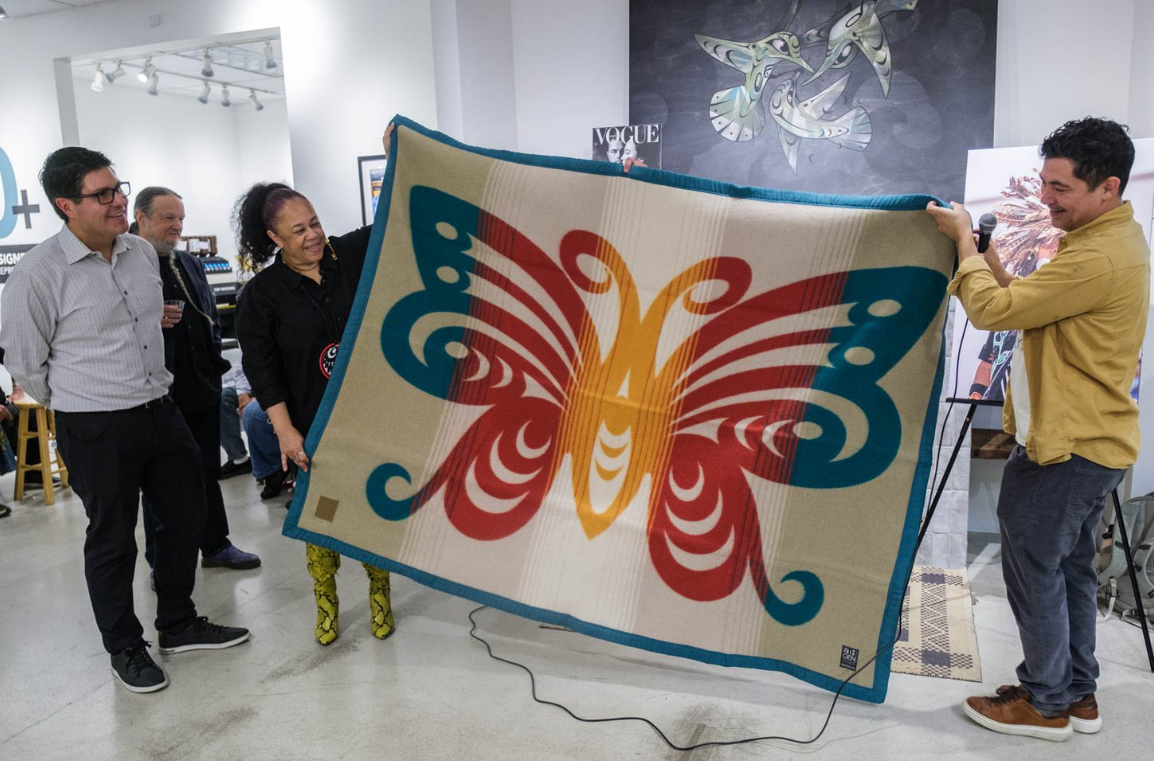
- Details
- By Omari Salisbury for Converge
SEATTLE - Nooksack visual artist, activist, and entrepreneur, Louie Gong, will announce a month-long partnership with Huy, an Indigenous non-profit organization providing economic, educational, rehabilitative and religious support for incarcerated Indigenous people. Gong’s first-of-a-kind design, the Never Say Goodbye wool blanket will be sold by Eighth Generation this fall.
A powerful and moving event recently unfolded in Seattle, celebrating the release of the Huy/Eighth Generation/Louie Gong butterfly blanket, a poignant symbol of transformation and hope for Indigenous people impacted by incarceration. Hosted by Eighth Generation and the Snoqualmie Tribe, the event wove together a tapestry of community leaders, formerly incarcerated individuals, and allies, all united by their commitment to healing, reintegration, and unwavering support for new beginnings.
Gabe Galanda, Huy’s Chairman and a citizen of the Round Valley Indian Tribes, eloquently articulated the urgent need to address the disproportionately high recidivism rates among Indigenous people. "The blanket really is intended for our relatives when they come home to have them wrapped in the warm embrace of a butterfly, which signifies to us transformation and metamorphosis," Galanda shared. The event, he explained, was designed to create a haven of acceptance and belonging where individuals could shed the weight of their past and step confidently into a future filled with promise.
[This article was first published by Converge. Used with permission. All rights reserved.]
Colleen Echohawk, CEO of Eighth Generation and a citizen of the Pawnee Nation of Oklahoma, spoke about the profound cultural significance of blankets in Native American communities. "In Indian country, we use blankets to really show how much we honor and respect someone," she explained. By wrapping individuals in the butterfly blanket, the community conveyed a powerful message of love, acceptance, and belief in their inherent worth. Echohawk emphasized the importance of extending this message of support to those currently incarcerated, assuring them that the Native community holds them in their hearts and eagerly anticipates their return.
Stacey Rice, the wife of Colville Tribal citizen Chief Rice, who has been incarcerated for nearly 40 years, offered a deeply personal and moving perspective on the importance of community support. "We want them to feel like they are successful. We want to help build them up to where they are successful because they give back to the community," she stated. Rice highlighted the ripple effects of incarceration, touching not only the incarcerated individual but also their families and communities. She called for understanding and empathy, emphasizing the importance of providing accessible resources and pathways for individuals to seek help, rebuild their lives, and contribute positively to their communities.
Jason Vickers, chef and owner of Natoncks Metsu and a formerly incarcerated individual himself, spoke candidly and powerfully about the challenges of reentering society after incarceration. "Not only the physical way of being, but the social way of being while incarcerated, is a very serious thing to learn when coming home," Vickers explained. He underscored the critical role of community involvement in easing the transition, offering practical support, and fostering a sense of connection. Vickers, who belongs to the Nipmuc Nation’s Hassanimsco Band, shared his own inspiring journey of finding purpose and belonging through community engagement, demonstrating the transformative power of second chances.
The event transcended its immediate purpose, becoming a powerful testament to the strength of community, the importance of compassion, and the unwavering belief in the human capacity for change. Through the symbolism of the butterfly blanket, Eighth Generation and Huy conveyed a message of hope and renewal, illuminating a path forward for Indigenous people on their journey to healing and reintegration. As the butterfly emerges from its cocoon, transformed and resplendent, so too can individuals emerge from their past experiences, stronger and more resilient, with the support of a loving and welcoming community.
Help us defend tribal sovereignty.
At Native News Online, our mission is rooted in telling the stories that strengthen sovereignty and uplift Indigenous voices — not just at year’s end, but every single day.
Because of your generosity last year, we were able to keep our reporters on the ground in tribal communities, at national gatherings and in the halls of Congress — covering the issues that matter most to Indian Country: sovereignty, culture, education, health and economic opportunity.
That support sustained us through a tough year in 2025. Now, as we look to the year ahead, we need your help right now to ensure warrior journalism remains strong — reporting that defends tribal sovereignty, amplifies Native truth, and holds power accountable.
 The stakes couldn't be higher. Your support keeps Native voices heard, Native stories told and Native sovereignty defended.
The stakes couldn't be higher. Your support keeps Native voices heard, Native stories told and Native sovereignty defended.
Stand with Warrior Journalism today.
Levi Rickert (Potawatomi), Editor & Publisher

